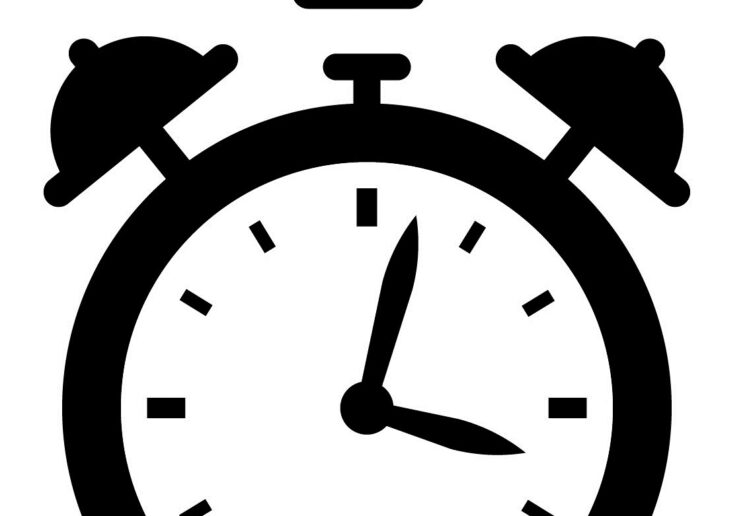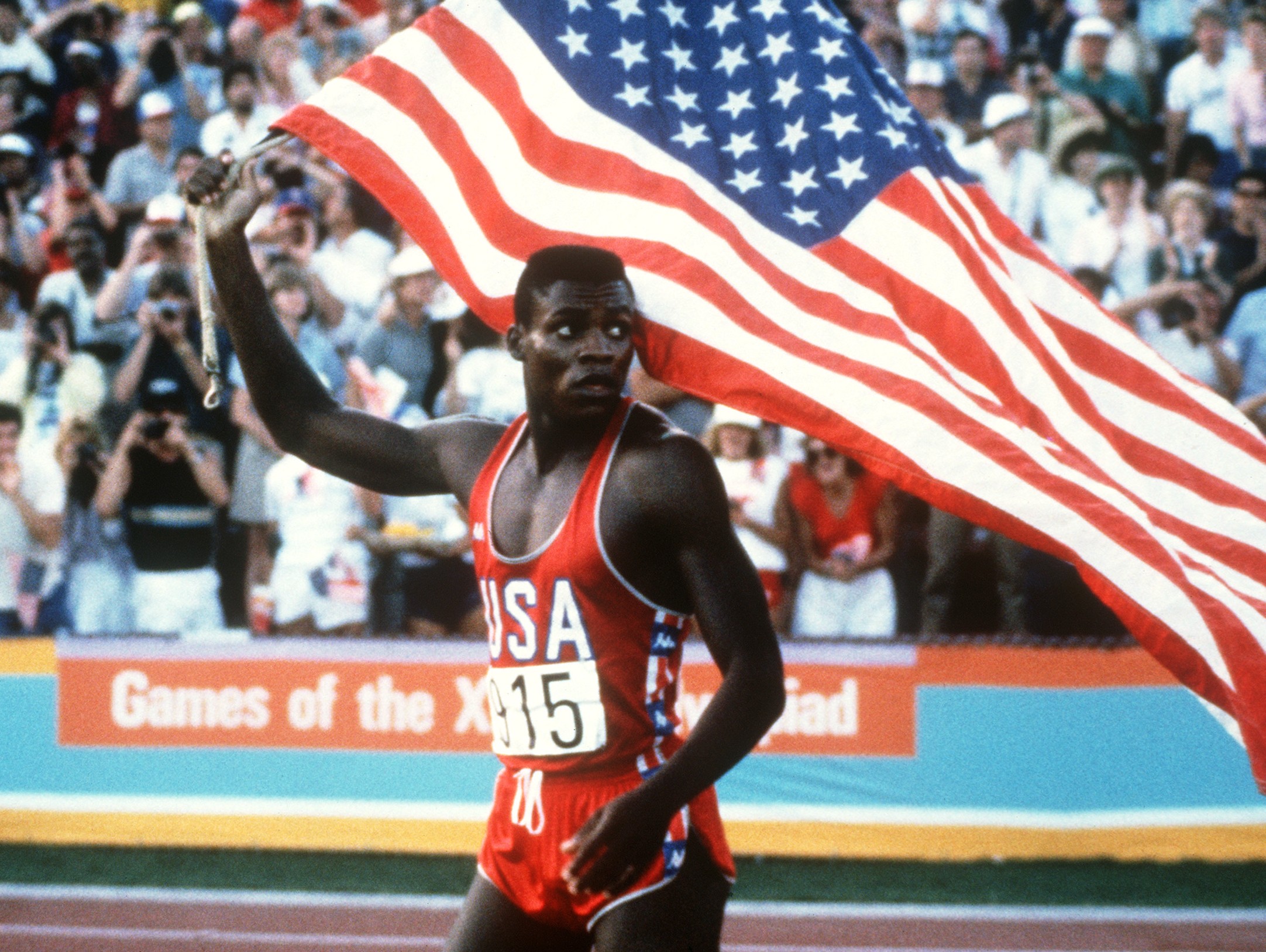Sleep is an essential component of health and well-being, with significant impacts on physical development, emotional regulation, cognitive performance, and quality of life. Along with being an integral part of the recovery and adaptive process between bouts of exercise, accumulating evidence suggests that increased sleep duration and improved sleep quality in athletes are associated with improved performance and competitive success. In addition, better sleep may reduce the risk of both injury and illness in athletes, not only optimizing health but also potentially enhancing performance through increased participation in training. Despite this, most studies have found that athletes fail to obtain the recommended amount of sleep, threatening both performance and health. Athletes face a number of obstacles that can reduce the likelihood of obtaining proper sleep, such as training and competition schedules, travel, stress, academic demands, and overtraining. In addition, athletes have been found to demonstrate poor self-assessment of their sleep duration and quality. In light of this, athletes may require more careful monitoring and intervention to identify individuals at risk and promote proper sleep to improve both performance and overall health.
Signs of sleep deprivation in athletes
Lack of sleep (also called “sleep debt”) appears to have a negative effect on sports performance, cognitive function, mood, and reaction time. There are a number of biological functions that can be altered following sleep deprivation. Changes in glucose metabolism and neuroendocrine function as a result of chronic, partial sleep deprivation may result in alterations in carbohydrate metabolism, appetite, food intake, and protein synthesis. Ultimately these factors can all negatively influence an athlete’s nutritional, metabolic and endocrine status and hence potentially reduce athletic performance. Sleep deprivation in athletes is associated with a number of undesirable effects. Some signs that an athlete may not be getting enough quality rest include:
- Quicker exhaustion
- Daytime sleepiness
- Decreased reaction time
- Difficulty making decisions
- Injury or illness
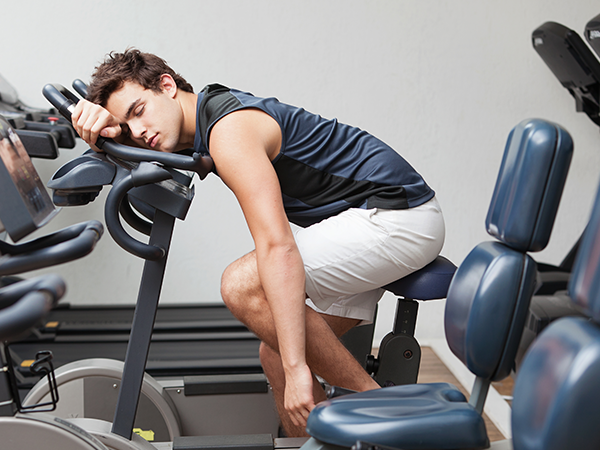
How much sleep do athletes need?
The amount of sleep an athlete gets appears to have a large impact on sports performance. Deep sleep helps improve athletic performance because this is the time when growth hormone is released. Growth hormone stimulates muscle growth and repair, bone building and fat burning, and helps athletes recover. Most people need about 7 to 9 hours of sleep a night. If you’re an athlete in training, you may need more. Just as athletes need more calories than most people when they’re in training, they need more sleep too. You’re pushing your body in practice, so you need more time to recover. Athletes in training should sleep about an hour extra. You can go to sleep earlier, or take an afternoon nap.
Sleep tips for athletes
Getting enough sleep takes commitment, just like training. It can be challenging to get adequate rest, particularly when working around a specific training or competition schedule. Some ways athletes can improve sleep quality include:
Make use of bright light and exercise: What your body does during waking hours can have a big effect on how it rests namely, the quality of sleep. Vigorous, daily exercise can trigger deeper, more restful sleep and even light exercise has been shown to cause solid improvements. Enjoying bright sunshine in the morning can also help reinforce circadian rhythms, but be careful to avoid too harsh or bright artificial light in the evening.
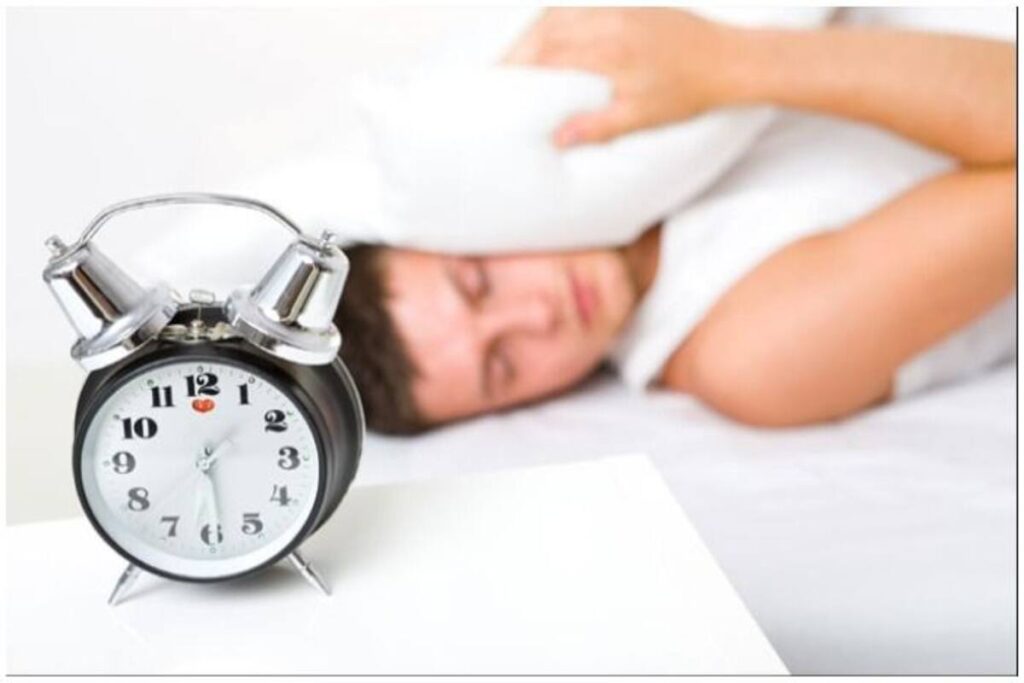
Eat foods that help you sleep: By eating certain sleep-inducing foods each night, there is a possibility that you will experience better sleep. Many chemicals, amino acids, enzymes, nutrients, and hormones work together to promote good sleep and regulate the sleep cycle. These include: tryptophan, melatonin, serotonin, gamma-aminobutyric acid (GABA), calcium, potassium, magnesium, pyridoxine, L-ornithine, histamine, acetylcholine, folate, antioxidants, vitamin D, B vitamins, zinc & copper. Although lots of foods contain low levels of these sleep-promoting compounds, only some have high concentrations that could potentially affect a person’s sleep cycle. Some of such foods are; whole grain foods, almonds, walnuts, warm milk, yogurt, honey, banana, kiwifruit, chamomile tea, cherries, fatty fish, turkey, chicken and eggs. Avoid high-fat foods & spicy foods within three hours of bedtime.
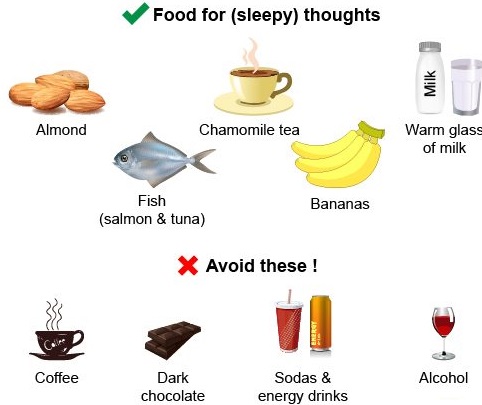
Create a relaxing routine: Your wind-down routine should last 20-30 minutes; it should be relaxing and get you ready for a restful sleep. Reading, journaling, or taking a warm bath can help you ease into rest, which may decrease the time it takes to fall asleep.
Optimize the bedroom environment: The body is regulated by circadian rhythms, which use environmental cues such as temperature, light and noise level to know when it is time to initiate sleep. For temperature, too cool is better than too warm. Set your thermostat between 60-70 degrees Fahrenheit, and have extra blankets close by in case you wake up cold. For darkness, look at installing some blackout curtains over your windows, or start using an eye mask. Blaring music, snoring roommates, door slamming, dog barking, loud traffic outside your apartment make falling asleep difficult. For noise control, think white noise, it helps to block out sudden intrusive noises. White noise is a type of noise that is produced by combining sounds of all different frequencies together. Use earplugs or a fan, or invest in a quality sound machine. There are also many “white noise” smartphone apps that offer similar benefits.

Keep oils, candles, or sachets in your room: Lavender in particular has been shown to reduce a person’s heart rate and blood pressure, relaxing the body and preparing it for sleep.
Build resilience: When you travel, give yourself time to get used to your new setting. If you’re traveling for an athletic competition, it’s a good idea to get there a few days early or even weeks. That way, your body can adjust and you have time to get on a normal sleep schedule.
Stick to a schedule: Maintaining a schedule can be challenging for athletes who travel or work around competition schedules. Decide on specific bedtimes and wake-up times, and be consistent with them. Waking up and going to bed at the same time every day will allow your body to regulate its internal clock, which in turn can often improve your quality of sleep. A regulated internal clock naturally teaches your body when to start falling asleep, and when to start returning to consciousness, which can help with insomnia and night waking. It might be difficult at first, but the effort will pay off.
Yoga, meditation & deep breathing before sleep: Practicing yoga before bedtime is a terrific way to release everything you’re holding onto mentally or physically before sinking into a peaceful night of deep sleep. Incorporating a relaxing yoga practice into your night time routine may improve the quality and duration of your sleep. Sleep meditations help create the inner conditions needed for a truly restful night. Because when we settle the mind, we rest the body, and that restfulness is what makes it easier to wind down and drift off. In scientific terms, meditation helps lower the heart rate by igniting the parasympathetic nervous system and encouraging slower breathing, thereby increasing the prospect of a quality night’s sleep. When we use deep breathing techniques for sleep, this sends a message to our brain that it is time to unwind and relax. We’re telling our brain to calm down and this has a knock-on effect for the rest of our body. Once our brain starts to relax and feel sleepy, the rest of our body will naturally follow. As you use your breathing exercises before sleeping, your heart rate slows down and your breathing steadies to a much slower pace. All of this is the body’s natural response to deep breathing, as it embraces relaxation. With increased feelings of relaxation, you’re more likely to fall asleep with ease.

Avoid caffeine & alcohol before bed: Caffeine is a stimulant, which means that it makes the body feel alert. Consuming caffeine near bedtime can make it difficult to fall or stay asleep. While avoiding alcohol may seem counterintuitive since it can make people sleepy, the drowsiness doesn’t last. As your alcohol levels start to fall during the night, it disrupts your sleep and makes you groggy and sluggish in the morning. Even a low intake of alcohol impairs sleep quality.
Avoid sleep medication: Unless a doctor has prescribed it, don’t take any sleep medications. Over-the-counter sleep aids are likely to disturb the quality of your sleep and your performance the next day.
Limit electronics: Electronic backlit devices such as smartphones, tablets, and laptops emit a special type of light, called blue light. Blue light can interfere with our natural circadian rhythm, which can delay feelings of sleepiness and make it difficult to go to bed. Avoiding screens before bed can help athletes fall asleep faster and rest deeper. If you do have to read from a screen, there are apps you can install that overlay the display with an orange or red tint, eliminating the blue light that can cause sleep difficulty. Get off your cellphone 30 minutes before you intend to fall asleep. Set it to automatically switch to “night mode” at sundown to decrease your exposure to blue light, which can make it more difficult to fall asleep. If you can’t turn off your phone because you rely on it for an alarm, turn it to airplane mode and place it out of reach.
Invest in high-quality sleep materials: You may think it doesn’t make much of a difference, but what you sleep on can have a major impact on the quality of sleep you’re getting. Your mattress should be comfortable yet supportive, and remember that most mattresses have a lifespan of 9-10 years, so it’s important to replace them when they’re no longer doing their job effectively. Mattresses come in different firmness levels to specifically fit your sleeping habits and position. You may have an expensive mattress that seems comfortable, but you’ll wake up sore, stiff, and achy if it’s not the right kind for you. If you’re a back sleeper, you’ll want a medium-firm mattress. Side sleepers need a mattress that’s medium-soft. Conversely, those who sleep on their stomach should look into getting firm mattresses. Pairing the right mattress with your sleep position will help ensure your spine, neck and hips are properly aligned and supported. This can decrease your risk of injury when you’re training or playing. Evaluate your sleep positions and make a pillow decision based on that: Side and back sleepers need a firmer pillow, while stomach sleepers need something flatter.
Implementing these strategies will improve your sleep quality, help you feel more rested in the morning, and improve your performance throughout your day. So, whether you are an athlete or coach, don’t underestimate the importance of sleep. You’ll be surprised by how much a healthy sleeping pattern will better your decisions and performance.

Dr Saranjeet Singh
Fitness & Sports Medicine Specialist
Lucknow (UP), INDIA

